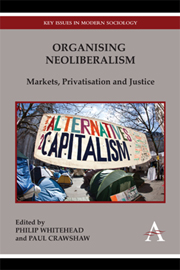Book contents
- Frontmatter
- Contents
- Chapter 1 Introduction: A Preliminary Mapping of the Terrain
- Chapter 2 Neoliberalism and Crime in the United States and the United Kingdom
- Chapter 3 Neoliberalism, Prisons and Probation in the United States and England and Wales
- Chapter 4 The Neoliberal Wings of the ‘Smoke-Breathing Dragon’: The Cigarette Counterfeiting Business and Economic Development in the People's Republic of China
- Chapter 5 A Neoliberal Security Complex?
- Chapter 6 The Influence of Neoliberalism on the Development of the English Youth Justice System under New Labour
- Chapter 7 Institutionalising Commercialism? The Case of Social Marketing for Health in the United Kingdom
- Chapter 8 Neoliberal Policy, Quality and Inequality in Undergraduate Degrees
- Chapter 9 Religion and Criminal Justice in Canada, England and Wales: Community Chaplaincy and Resistance to the Surging Tide of Neoliberal Orthodoxy
- Chapter 10 Markets, Privatisation and Justice: Some Critical Reflections
- Notes on Contributors
- Index
Chapter 2 - Neoliberalism and Crime in the United States and the United Kingdom
Published online by Cambridge University Press: 05 February 2013
- Frontmatter
- Contents
- Chapter 1 Introduction: A Preliminary Mapping of the Terrain
- Chapter 2 Neoliberalism and Crime in the United States and the United Kingdom
- Chapter 3 Neoliberalism, Prisons and Probation in the United States and England and Wales
- Chapter 4 The Neoliberal Wings of the ‘Smoke-Breathing Dragon’: The Cigarette Counterfeiting Business and Economic Development in the People's Republic of China
- Chapter 5 A Neoliberal Security Complex?
- Chapter 6 The Influence of Neoliberalism on the Development of the English Youth Justice System under New Labour
- Chapter 7 Institutionalising Commercialism? The Case of Social Marketing for Health in the United Kingdom
- Chapter 8 Neoliberal Policy, Quality and Inequality in Undergraduate Degrees
- Chapter 9 Religion and Criminal Justice in Canada, England and Wales: Community Chaplaincy and Resistance to the Surging Tide of Neoliberal Orthodoxy
- Chapter 10 Markets, Privatisation and Justice: Some Critical Reflections
- Notes on Contributors
- Index
Summary
Introduction
This chapter begins to develop the theme of the rise of neoliberalism in the United States of America, the United Kingdom, and other countries alluded to in the introductory chapter. It considers the extent to which neoliberal ideologies are an inevitable consequence of globalisation and to what extent they are a hegemonic project of some academic and political elites. It then goes on to consider the link between neoliberalism, crime and the criminal justice system.
The Historical Evolution of Liberalism
Historically, liberalism has been associated with the demise of the doctrine of the divine right of kings and its replacement by the concept of a written constitution and the gradual expansion of electoral democracy. Probably the most important fundamental text of liberalism is John Locke's Second Treatise on Government. Locke wrote this in order to justify the Glorious Revolution of 1688, in which William of Orange was invited by British political notables to replace James II. William of Orange arrived with a large army and a printing press, which turned out pamphlets indicating that his intentions were peaceful and that he wanted his monarchy to function pretty much as a rubber stamp to Acts of Parliament. William's political success can be seen as the foundation of the modern British constitutional settlement in which the monarchy is basically decorative rather than absolutist and the state is republican in all but name.
- Type
- Chapter
- Information
- Organising NeoliberalismMarkets, Privatisation and Justice, pp. 23 - 44Publisher: Anthem PressPrint publication year: 2012
- 1
- Cited by



